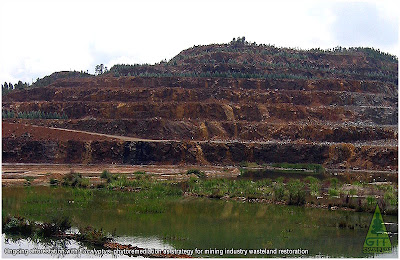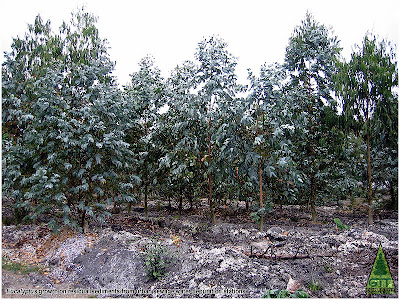Ecological restoration... by planting Eucalyptus
(Ironías al darle la vuelta a la tortilla... verde)
Gustavo Iglesias Trabado 
GIT Forestry Consulting - Consultoría y Servicios de Ingeniería Agroforestal - www.git-forestry.com

GIT Forestry Consulting - Consultoría y Servicios de Ingeniería Agroforestal - www.git-forestry.com
Trees with bad press, frequently associated to ecological degradation, soil and/or water depletion or the already too wasted mantra "nothing grows under gum trees", Eucalyptus can be exactly the opposite. Today we see a case of phytoremediation in which these trees are used in three different but complementary ways.
1) Eucalyptus as fast growing pioneer species to cover denuded soils
 Fig. 1: Terraces of an abandoned copper mine are progressively afforested with Eucalyptus (in this case, E. globulus ssp. globulus)
Fig. 1: Terraces of an abandoned copper mine are progressively afforested with Eucalyptus (in this case, E. globulus ssp. globulus)- Their fast growing new vegetation cover will contribute to minimise soil erosion and lixiviation of hazardous heavy metals to aquifers or river systems by controlling direct rainfall impact effects on bare soils and by retaining it with their root systems.
- Their plasticity adapting to different site conditions allows them to grow on extremely recalcitrant soils for plant colonisation overcoming extreme acidity and lack on nutrients with a proper preparation of the new planting area.
- Their extreme efficiency producing biomass from limited resources allows a quick deposition of organic matter on denuded soils, creating new superficial horizons (topsoil) to substitute those eliminated by mining operations, which will later allow successful survival of other types of vegetation in places where it was previously impossible.
2) Eucalyptus as recyclers of organic residues generated by different industries
 Fig. 2: Soil ammendement with residual urban sewage sludges helps Eucalyptus establishment via input of easily available nutrients
Fig. 2: Soil ammendement with residual urban sewage sludges helps Eucalyptus establishment via input of easily available nutrients- Their ability to survive on extremely unhospitable soils is aided by the application of different elements able to ammend critical soil properties and favour a quick development of a new tree cover.
- Solid fractions of residues from urban sewage water treatment plants, milk processing industry sediments, residual solid fractions from cellulosic pulp mill industrial processes, and calcium carbonate rich residual crushed shells from seafood processing industries find a safe place in which to degrade and release the initial load of nutrients that will be recycled by the trees and later added to the soil as degrading biomass to close a new cycle of nutrients. In addition, these residues now turned into subproducts do contribute to favourable physical and chemical properties of this artificial soil.
3) Eucalyptus as rhizofilters (green filters)
- Properly designed additional Eucalyptus tree belts strategically arranged along natural or artificial drainage lines act as a green filter when their roots capture heavy metal lixiviates that will be stored in tree biomass, avoiding immediate hazards of water contamination for nearby agricultural or urban areas.
- In the medium term the accumulation of toxic water in decantation pools will be minimised, and with the help of other resistant herbaceous plantings and these and other fast growing trees cultivated in sequential stages, new soils will start to develop where there was none.
(1+2+3) Eucalyptus as successful tools for Ecological Restoration
Ecological Restoration by planting eucalypts yields in this practical case the following positive externalities:
- Soil erosion control
- Safe disposal of the organic residues generated by four different industrial lines
- Immobilisation of heavy metals and other hazardous chemicals
- Formation of a new soil that will support vegetation in future
Without forgetting a couple of classical benefits arising from tree growing:
- Carbon sequestration, contributing to minimise climate change
- The extra of timber production in a previously improductive land
What a trip... from "nothing grows under gum trees"... to "nothing would grow without Eucalyptus". Ironies of bioengineering.
![]() Subscribe to receive EUCALYPTOLOGICS via RSS
Subscribe to receive EUCALYPTOLOGICS via RSS
© 2007 Gustavo Iglesias Trabado. Please contact us if you want to use all or part of this text and photography elsewhere. We like to share, but we do not like rudeness.



































![Validate my Atom 1.0 feed [Valid Atom 1.0]](http://gus.iglesias.googlepages.com/valid-atom.png)




















1 Comments by our readers :::
The use of eucalypts for the restoration of spoiled environments seem to me one of the most convincing ones at all ...
Let us see whether it will work in Germany, some day, too.
Send a comment to EUCALYPTOLOGICS